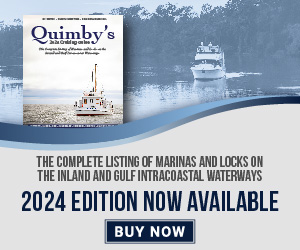The California Air Resources Board (CARB) is expanding its Commercial Harbor Craft rule to all marine vessels (except fishing vessels) to reduce particulate matter (PM)—i.e., soot—emissions. The only way commercial marine vessels with engines of 600 kW or above can comply is to install Tier 4 engines with diesel particulate filters (DPFs) attached—never mind that there are no existing feasible DPFs yet for commercial tugboat diesel engines.
Despite years of behind-the-scenes conversations and a letter of concern from the Coast Guard, CARB has ignored the marine industry’s concerns. Tugboat and towboat operators say the mandate, with a mere six-month window, amounts to an unachievable ultimatum that will force many operators to either go out of business or leave the state and relocate elsewhere.
Since the Environmental Protection Agency issued strict PM emission rules in 2007, CARB has required DPFs on all land-based diesel engines. The idea behind DPFs is simple enough. They are essentially small aftertreatment bolt-on filtered furnaces, designed to capture diesel exhaust carbon soot particles and apply very high heat (up to 600 degrees Fahrenheit) to ignite catalysts in the filter to burn them into harmless ash, a process called regeneration. DPFs can remove anywhere from 85 percent to close to 100 percent of soot from diesel emissions, in theory.
Millions of DPFs have been installed and used on trucks and recreational marine vessels. Early models had a tendency to spontaneously combust. DPFs were blamed for several major wildfires, causing users to nickname them “dangerous potential fires” and causing at least one maker to go bankrupt. The trucking industry and its suppliers have since spent billions of dollars and have had 15 years to work out the kinks. Despite some improvements, DPFs are still expensive and finicky.
But the diesel engines on towboats and tugboats are different. They burn higher-sulfur diesel fuel and operate at lower engine speeds, requiring higher burn-off temperatures—up to 1,500 degrees, according to the Coast Guard, which told CARB in an August 2021 letter, “This is a safety issue, and while there are no federal regulations that prohibit using a Tier 4 engine and DPFs, practicality has to be considered.” Apart from the serious safety issue, imagine the environmental damage that a DPF fire and resulting spill on a towboat or tugboat might cause.
The Coast Guard observed that “there are currently limited options, or no options in some cases, for Tier 4 engines certified for various types of vessels.” A recent editorial co-written by the vice president of the Masters, Mates and Pilots Union and the owner/operator of a Bay Area tug outfit said, “In an ideal world, these DPFs would be safe and available off the shelf for the industry. The problem is–they are not. There are no DPFs commercially available for our sector of maritime.”
Even if there were, the estimated cost of compliance for owners and operators of California’s 68 covered vessels is $1.3 billion. In addition, not all covered vessels can feasibly convert to Tier 4 engines; some operators would have to reconfigure their vessels to do so, making a conversion uneconomic.
A bill to address the shortcomings in the harbor craft rule was introduced in the California legislature. The bill would have simply ensured that a standard safety review process is followed, engine warranties would not be voided, and mariners would be able to maintain power if any equipment failed. Nevertheless, CARB staff intervened, saying the agency had taken safety into account. The chair of the Assembly Transportation Committee refused to schedule a hearing to assess the bill’s merits.
None of the rule’s goals are achievable under the six-month mandate. What’s more, the rule provides no contingency should equipment fail.
On August 21, American Waterways Operators President Jennifer Carpenter addressed an urgent letter to California Gov. Gavin Newsom, asking him to take immediate action to mitigate or delay these rules in order to “avert serious risks to human life, the environment, the supply chain and the development of offshore wind energy that will result if the California Air Resources Board does not change its recent amendments to the Commercial Harbor Craft rule.”
As Carpenter points out, “AWO member companies operate the world’s first hybrid tugboat in California and are currently developing the nation’s first zero-emissions ship-assist vessel for operation in the state. Our industry’s contributions to the economy and supply chain are also particularly important to California, which ranks third among states in waterborne commerce by tonnage and fourth by economic impact, with more than $12.2 billion in annual economic activity driven by the domestic maritime transportation industry.”
By pressing down too hard and fast on the climate accelerator, CARB officials risk burning out a vital component of California’s economic engine. No one is asking it to change the destination—just to ease its foot off the pedal.




